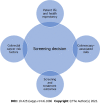Practical considerations for colorectal cancer screening in older adults
- PMID: 35949211
- PMCID: PMC9244986
- DOI: 10.4251/wjgo.v14.i6.1086
Practical considerations for colorectal cancer screening in older adults
Abstract
Recent guidelines recommend that colorectal cancer (CRC) screening after age 75 be considered on an individualized basis, and discourage screening for people over 85 due to competing causes of mortality. Given the heterogeneity in the health of older individuals, and lack of data within current guidelines for personalized CRC screening approaches, there remains a need for a clearer framework to inform clinical decision-making. A revision of the current approach to CRC screening in older adults is even more compelling given the improvements in CRC treatment, post-treatment survival, and increasing life expectancy in the population. In this review, we aim to examine the personalization of CRC screening cessation based on specific factors influencing life and health expectancy such as comorbidity, frailty, and cognitive status. We will also review screening modalities and endoscopic technique for minimizing risk, the risks of screening unique to older adults, and CRC treatment outcomes in older patients, in order to provide important information to aid CRC screening decisions for this age group. This review article offers a unique approach to this topic from both the gastroenterologist and geriatrician perspective by reviewing the use of specific clinical assessment tools, and addressing technical aspects of screening colonoscopy and periprocedural management to mitigate screening-related complications.
Keywords: Aged; Cancer screening; Colonoscopy; Colorectal cancer; Early detection of cancer; Elderly.
©The Author(s) 2022. Published by Baishideng Publishing Group Inc. All rights reserved.
Conflict of interest statement
Conflict-of-interest statement: The authors disclose no conflicts of interest or external funding for this publication.
Figures




Similar articles
-
Fecal occult blood test for colorectal cancer screening: an evidence-based analysis.Ont Health Technol Assess Ser. 2009;9(10):1-40. Epub 2009 Sep 1. Ont Health Technol Assess Ser. 2009. PMID: 23074514 Free PMC article.
-
Colorectal Cancer Screening and Surveillance Colonoscopy in Older Adults.Curr Treat Options Gastroenterol. 2019 Jun;17(2):292-302. doi: 10.1007/s11938-019-00230-9. Curr Treat Options Gastroenterol. 2019. PMID: 30969399 Free PMC article. Review.
-
Colorectal cancer screening and surveillance in the elderly patient.Am J Gastroenterol. 2011 Jul;106(7):1197-206;quiz 1207. doi: 10.1038/ajg.2011.128. Epub 2011 Apr 26. Am J Gastroenterol. 2011. PMID: 21519362 Review.
-
Screening for Colon Cancer in Older Adults: Risks, Benefits, and When to Stop.Mayo Clin Proc. 2020 Jan;95(1):184-196. doi: 10.1016/j.mayocp.2019.02.021. Mayo Clin Proc. 2020. PMID: 31902414 Review.
-
Colon cancer screening in U.S. adults aged 65 and older according to life expectancy and age.J Am Geriatr Soc. 2015 Apr;63(4):750-6. doi: 10.1111/jgs.13335. J Am Geriatr Soc. 2015. PMID: 25900488
Cited by
-
Comparative Analysis of Machine Learning Models for Image Detection of Colonic Polyps vs. Resected Polyps.J Imaging. 2023 Oct 9;9(10):215. doi: 10.3390/jimaging9100215. J Imaging. 2023. PMID: 37888322 Free PMC article.
-
Incorporating Novel Technologies in Precision Oncology for Colorectal Cancer: Advancing Personalized Medicine.Cancers (Basel). 2024 Jan 23;16(3):480. doi: 10.3390/cancers16030480. Cancers (Basel). 2024. PMID: 38339232 Free PMC article. Review.
-
Competitive Risk Analysis of Prognosis in Older Adults with Sigmoid Colon Adenocarcinoma: A Population-Based Study.Cancer Control. 2024 Jan-Dec;31:10732748241262184. doi: 10.1177/10732748241262184. Cancer Control. 2024. PMID: 38868954 Free PMC article.
-
The Impact of Age on Preferences for Colorectal Cancer Surveillance Strategies: Are Fecal Immunochemical Tests FIT for Surveillance?Cancer Med. 2025 Mar;14(5):e70723. doi: 10.1002/cam4.70723. Cancer Med. 2025. PMID: 40029035 Free PMC article.
-
Evaluation of Morbidity and Mortality in Iatrogenic Colonic Perforation During Colonoscopy: A Comprehensive Systematic Review and Meta-Analysis.Cureus. 2024 Nov 8;16(11):e73302. doi: 10.7759/cureus.73302. eCollection 2024 Nov. Cureus. 2024. PMID: 39655125 Free PMC article. Review.
References
-
- American Cancer Society. Colorectal Cancer Facts and Figures 2020-2022. Atlanta: American Cancer Society 2020.
-
- National Cancer Institute. SEER Cancer Statistics Review, 1975-2018. [cited September 21, 2021] Available from: https://seer.cancer.gov/csr/1975_2018/
-
- National Cancer Institute. Percent of Deaths by Age Group: Colorectal Cancer. [cited November 15, 2021] Available from: https://seer.cancer.gov/statfacts/html/colorect.html .
-
- Shaukat A, Kahi CJ, Burke CA, Rabeneck L, Sauer BG, Rex DK. ACG Clinical Guidelines: Colorectal Cancer Screening 2021. Am J Gastroenterol. 2021;116:458–479. - PubMed
-
- USPSTF U.S. Preventative Services Task Force. In: Final Recommendation Statement. 2021. [cited December 13, 2021] Available from: https://www.uspreventiveservicestaskforce.org/uspstf/recommendation/colo... .
Publication types
LinkOut - more resources
Full Text Sources

